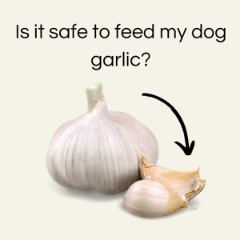Garlic To prevent Fleas In Dogs

There are many products arriving to the dog care market containing garlic as a form of flea and tick prevention. While garlic confers some long-term anti-cancer benefits it does not help with blood health in dogs. Specifically, garlic, along with other alliums in volume reduce red blood cell count.
With the myriad of adverts and social media campaigns promoting natural flea control methods it’s difficult to establish the base line details to be able to make your own informed decision. So, will garlic prevent fleas or is it a myth with an aroma?

The products indicate feeding your pet garlic amends their odour or blood chemistry making them unappealing to fleas. Although garlic does carry a distinct odour it's unlikely to deter fleas from feeding on your pet. There's scarce scientific evidence supporting the notion that garlic can alter a pet's blood chemistry, but we must remember that garlic, especially in large amounts, can be harmful to pets. Garlic contains thiosulfate, a substance toxic upon consuming, which can lead to diarrhoea, anaemia, vomiting and other serious health issues.
The information currently available suggests using garlic to deter or remove fleas is not advisable or an effective solution for parasite control.

Your best defence against these pesky parasites is to seek veterinary advice to discuss options. Do keep in mind that fleas spend a short time on your pet, the eggs the adult fleas produce fall off the pet to be distributed in bedding, carpets, soft furniture, even gaps in floorboards where they hatch into larvae.
A flea’s development process takes them through a pupae stage leading full circle back to an adult flea, this is why treating a flea infestation can be challenging as it’s not just the pet that requires flea treatment.
Are you itching now?
-
Posted in
Canine Digestion, Competition dogs, Competitions, Cranberry for dogs, Crufts, Dog Agility, Dog Anxiety, dog bad breath, Dog Blood Donation, Dog diarrhoea, Dog digestion, Dog dull coat, Dog gut problems, Dog health, Dog heart Failure, dog itchy skin, dog joint pain, dogs teeth cleaning, Ear infection, elderly/senior, Gun dogs, Health, Injured dogs, New Technology, Safety, Veterinarian










